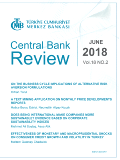
Central Bank Review
Scope & Guideline
Fostering innovation in central banking scholarship.
Introduction
Aims and Scopes
- Monetary Policy Analysis:
The journal extensively covers the mechanisms and implications of monetary policy, including its transmission effects across various economies and markets. - Financial Stability and Risk Assessment:
Research on financial stability, systemic risks, and the regulatory frameworks affecting banking systems is a core focus, addressing the challenges faced by central banks. - Economic Performance Metrics:
Contributions often explore economic indicators such as inflation, employment, and output, with innovative methods to measure and analyze these metrics. - International Economics and Global Interconnectedness:
The journal examines how global economic conditions and external shocks influence domestic economies, particularly in emerging markets. - Empirical Methodologies:
There is a consistent use of advanced empirical techniques, including econometric modeling, machine learning, and time-series analysis, to derive insights from data.
Trending and Emerging
- Impact of Global Economic Conditions:
Recent publications increasingly analyze the influence of global economic shocks and conditions on local economies, highlighting the interconnectedness of financial systems. - Innovative Metrics for Inflation and Economic Indicators:
There is a growing interest in developing new metrics and models for assessing inflation and potential output, reflecting the need for more accurate economic forecasting. - Financial Technology (FinTech) and Central Banking:
Emerging studies are focusing on the implications of FinTech for monetary policy and financial stability, indicating a shift towards integrating technology with traditional banking practices. - Behavioral Economics in Monetary Policy:
Papers are increasingly exploring the psychological factors influencing economic behavior and decision-making, particularly in the context of central bank communications and public expectations. - Environmental and Sustainability Factors in Economics:
Research is beginning to incorporate sustainability considerations into economic analysis, reflecting a broader trend towards integrating environmental concerns with financial stability and policy.
Declining or Waning
- Traditional Banking Sector Analysis:
There has been a noticeable decrease in papers focusing solely on traditional banking sector performance metrics without the integration of broader economic contexts or innovative methodologies. - Longitudinal Studies on Historical Economic Events:
Research that looks at historical economic crises or events has become less prevalent, possibly overshadowed by the need for timely analysis of current economic conditions and policies. - Niche Topics in Microfinance:
Microfinance and its implications for broader economic policies appear to be waning, suggesting a shift towards more macroeconomic themes and central banking strategies.
Similar Journals
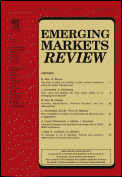
Emerging Markets Review
Exploring the Frontiers of Emerging EconomiesEmerging Markets Review, published by Elsevier, stands as a leading platform for scholarly discourse in the fields of Business, International Management, and Economics. With a strong focus on the dynamic and evolving landscapes of emerging markets, this journal boasts an impressive impact factor, reflecting its high-quality research and significant contribution to the academic community. Covering a wide array of topics pertinent to emerging economies, the journal is dedicated to disseminating cutting-edge research findings, theoretical advancements, and practical insights that are essential for both researchers and industry professionals. Operating since 2000, and with its converged years extending to 2024, Emerging Markets Review has secured a Q1 category ranking in both its primary domains (Business and International Management; Economics and Econometrics), underscoring its critical role in shaping knowledge and practices in these fields. The journal's esteemed reputation is further highlighted by its strong Scopus rankings, placing it among the top percentile for relevant subject areas. Although it is not an Open Access journal, it remains accessible through institutional subscriptions, ensuring that the wealth of knowledge contained within its pages reaches a broad audience.

Annals of Economics and Finance
Innovating Research for Tomorrow's Economic Challenges.Annals of Economics and Finance is an esteemed academic journal published by Wuhan University Journals Press, focusing on the fields of Economics and Finance. Established in 2000, this journal serves as a platform for scholars to disseminate their research findings and insights, contributing to the development of these disciplines through rigorous peer-reviewed articles. Despite currently holding a Q4 ranking in both Economics and Econometrics and Finance categories (2023), it strives to enhance its impact on the academic community and policy-making audiences. While not Open Access, the journal seeks to cultivate a deeper understanding of vital economic theories and financial practices, thereby offering invaluable resources for researchers, professionals, and students alike. With its broad scope, the Annals of Economics and Finance is poised to play a crucial role in shaping contemporary economic discourse up to 2024 and beyond.
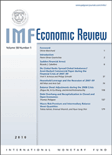
IMF Economic Review
Fostering Deeper Insights into Economic Theories and PracticesIMF Economic Review, published by Palgrave Macmillan Ltd, stands as a preeminent journal in the fields of Economics and Business Management, holding a prestigious Q1 ranking in both categories as of 2023. With an ISSN of 2041-4161 and an E-ISSN of 2041-417X, this journal not only showcases high-quality, peer-reviewed research but also embraces the principles of Open Access, promoting wide dissemination of its findings to researchers, professionals, and students alike. Spanning significant years from 2010 to 2024, the IMF Economic Review features innovative analyses and insights that challenge conventional economic paradigms and foster deeper understanding of global economic dynamics. Its impressive Scopus ranking places it in the top 10% of economics journals globally, affirming its vital role in advancing academic discourse and practical application in economics and finance. For those dedicated to exploring the intricacies of economic theory and practice, the IMF Economic Review is an invaluable resource that not only informs but also inspires.
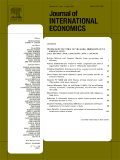
JOURNAL OF INTERNATIONAL ECONOMICS
Pioneering research in international economic interactions.JOURNAL OF INTERNATIONAL ECONOMICS, published by ELSEVIER, stands at the forefront of advancing knowledge in the fields of economics and finance. With an esteemed Q1 ranking in both Economics and Econometrics and Finance categories, this journal has established itself as a premier platform for disseminating innovative research. Since its inception in 1971, the journal has provided critical insights into the dynamics of international economic interactions, making it essential reading for researchers, professionals, and students seeking to understand complex global economic issues. With access to high-quality, peer-reviewed articles, readers can stay abreast of the latest trends, methodologies, and empirical findings shaping the economic landscape. Based in the Netherlands, the journal continues to attract contributions from leading experts worldwide, with its rigorous selection process ensuring that only the most impactful research is published, further enhancing its significance in the academic community.

FEDERAL RESERVE BANK OF ST LOUIS REVIEW
Unveiling insights for a stable financial future.The Federal Reserve Bank of St. Louis Review is a prestigious academic journal published by the Federal Reserve Bank of St. Louis, dedicated to disseminating high-quality research in the field of economics and finance. As a respected publication, it holds a significant position in its domain, as evidenced by its placement in the Q2 quartile in the Business and International Management category and ranking 210 out of 443 in Scopus. The journal offers an insightful platform for researchers, professionals, and students alike to engage with cutting-edge analyses and discussions, emphasizing topics relevant to monetary policy, economic trends, and financial stability. Although it operates without an Open Access model, its articles are instrumental for those looking to deepen their understanding of economic dynamics and policy implications in today’s global marketplace. With a commitment to fostering scholarly exchange, the Federal Reserve Bank of St. Louis Review remains a vital resource for advancing knowledge and practical solutions in economics and finance.

American Economic Journal-Macroeconomics
Shaping Economic Thought Through Rigorous ResearchAmerican Economic Journal-Macroeconomics, published by the American Economic Association, stands at the forefront of economic research, addressing pivotal macroeconomic issues that shape global economies. With an impressive Scopus rank of #8 out of 288 in its field and a notable 97th percentile ranking, this journal is widely regarded as a top-tier publication, specifically categorized in the Q1 category for Economics, Econometrics, and Finance as of 2023. Operating under ISSN 1945-7707 and E-ISSN 1945-7715, it aims to disseminate high-quality research from 2009 through 2024 and beyond, providing crucial insights into macroeconomic theory and policy. Although the journal currently does not operate under an open access model, it remains a vital resource for researchers, economists, and students seeking to deepen their understanding of macroeconomic dynamics and their implications for economic policy worldwide. The journal's impactful contributions make it an essential read for those striving to influence economic thought and practice.
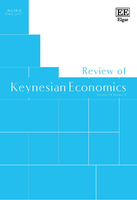
Review of Keynesian Economics
Illuminating the Path of Economic DiscourseReview of Keynesian Economics, published by Edward Elgar Publishing Ltd, stands as a pivotal platform for scholarly discourse within the Economics and Econometrics field. With its ISSN 2049-5323 and E-ISSN 2049-5331, the journal has cultivated a robust reputation since its inception in 2012, recently earning recognition as a Q2 journal in its 2023 category rankings. The journal aims to delve into contemporary issues through the lens of Keynesian theory, fostering innovative research and critical analysis that challenges prevailing economic paradigms. Although the journal features no open access options, its rich repository of peer-reviewed articles provides invaluable insights for researchers, professionals, and students alike, making it a staple resource for those keen on exploring the evolving landscape of economic thought. With a Scopus rank of 300/716 in the realm of Economics, this journal occupies a notable position, reflecting its continued relevance and impact within the academic community.

CESifo Economic Studies
Bridging Theory and Empirical Findings in EconomicsCESifo Economic Studies, published by Oxford University Press, is a distinguished academic journal that focuses on the interdisciplinary exploration of economics and its implications on society. With an ISSN of 1610-241X and an E-ISSN of 1612-7501, the journal aims to disseminate high-quality research that contributes to the advancement of economic knowledge, particularly emphasizing empirical findings and innovative theoretical frameworks. As a recognized leader in its field, CESifo Economic Studies holds a 2023 Q2 ranking in both Economics and Econometrics and Geography, Planning and Development, reflecting its significant impact and relevance in these areas. The journal is accessible through traditional subscription models, ensuring that critical economic research remains available to scholars, policymakers, and educators alike. With a commitment to excellence in publication, the journal supports the academic community through the provision of rigorous peer-reviewed articles that address current challenges and trends in economics. Researchers and students seeking to deepen their understanding of economic mechanisms will find this journal an invaluable resource.
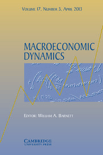
MACROECONOMIC DYNAMICS
Elevating Understanding of Economic Trends and ImpactsMACROECONOMIC DYNAMICS, a distinguished academic journal published by Cambridge University Press, serves as a pivotal platform for innovative research in the fields of economics and econometrics. With its ISSN 1365-1005 and E-ISSN 1469-8056, the journal has been at the forefront of scholarly communication since its inception in 1997, offering an extensive range of articles that explore dynamic economic models, policy impacts, and theoretical advancements through the latest empirical analyses. Currently holding a Q2 ranking within the 2023 Economics and Econometrics category, and positioned at rank #409 out of 716 within Scopus, it is an essential resource for researchers, professionals, and students alike, looking to stay updated on critical developments in macroeconomic theory and practice. Although it follows a traditional subscription model rather than Open Access, the journal continually strives to disseminate high-quality, peer-reviewed content that informs and inspires the global economics community. The importance of MACROECONOMIC DYNAMICS lies in its commitment to fostering a deeper understanding of economic phenomena, making it a must-read for anyone engaged in the complexities of the economic landscape.

Annual Review of Financial Economics
Unveiling Insights in Financial EconomicsAnnual Review of Financial Economics, published by Annual Reviews, stands as a pivotal journal in the fields of Economics and Finance, recognized for its rigorous analysis and comprehensive reviews since its inception in 2010. With an impressive impact factor reflected in its Q1 ranking in both Economics and Econometrics and Finance for 2023, this journal serves as an essential resource for researchers, professionals, and students keen on understanding the dynamic interplay of financial theories and practices. The ISSN 1941-1367 and E-ISSN 1941-1375 signal its commitment to accessibility and dissemination of cutting-edge research within the community. Addressing crucial topics from market behavior to economic modeling, each annual volume synthesizes the latest findings and theoretical advancements, thus contributing significantly to the global discourse within financial economics. With its high Scopus rankings, including a finance rank of #75 out of 317, the journal continues to foster a deep understanding of financial systems and their implications, serving as an invaluable tool for anyone engaged in the broader economic landscape.